News & Events in Belarus
Nuclear deterrence, Eurasian jubilee, Victory parade, flag from outer space in President’s Week
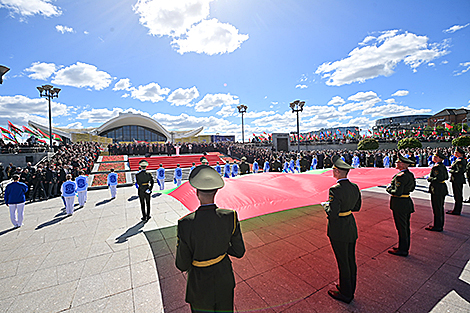
The work schedule of the Belarus president is always full of events. Aleksandr Lukashenko holds conferences and working meetings on the most topical matters concerning the country’s development, regularly visits the regions, goes on foreign trips and welcomes foreign guests, talks to reporters, signs decrees and laws. And even if there are no public events, it does not mean that the head of state does not work. It must be said that even when he relaxes, for instance, by playing ice hockey or chopping firewood, Aleksandr Lukashenko happens to find the time to give yet another instruction. All the decisions must be prompted by life, he likes to say.
The President’s Week project is intended for those, who want to keep up with the head of state, be up-to-date on the latest statements and decisions of the Belarusian leader.
The past week has been full of festive occasions. The key one was Victory Day. And not only for Belarus. This holiday is celebrated particularly broadly in Belarus and Russia. Aleksandr Lukashenko welcomed in this holiday during an army parade in Moscow first. Then he traditionally took part in festivities in the Belarusian capital in the evening.
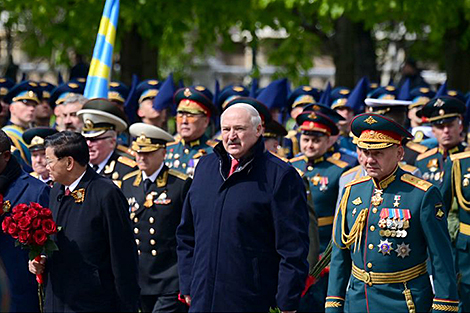
Apart from that, on 7 May, the day before the working visit to Russia the president made a speech during a solemn meeting held in anticipation of Victory Day. For Belarusians it is important to preserve memory and historic truth about the Great Patriotic War but the country has also drawn conclusions from that tragedy from the point of view of ensuring security in current complicated times. Aleksandr Lukashenko’s statements about a joint exercise meant to practice the deployment of non-strategic nuclear weapons became the most talked about and quoted statements of the week. Aleksandr Lukashenko repeatedly stated that Belarus is not going to attack anyone, even more so using nuclear weapons, but in case of external aggression it will deliver a tough response without waiting for the adversary to cross some red lines.
An important date in the Eurasian Economic Union, of which Belarus is a member state. The president took part in a jubilee summit in Moscow. It was timed to the 10th anniversary of the signing of the Eurasian Economic Union Treaty. The common conclusion is that obvious accomplishments are available but the parties have yet to do a lot of work together since some issues have not been resolved.
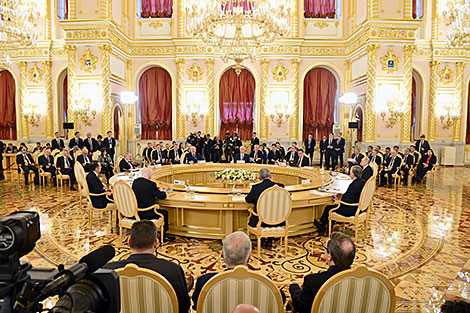
The week concluded with yet another holiday of significance for Belarus – Day of the State Flag, the State Emblem and the National Anthem. The president stressed that Belarusian symbols just like the entire policy are inspired by ideas of national dignity and true people’s rule. He also explained why this holiday is full of special symbolism for him.
The other day Aleksandr Lukashenko also commented on the Polish judge Tomasz Szmydt’s escape to Belarus. The president dismissed allegations that this man had been recruited by Belarusian security agencies: “They had a look. He is an absolutely normal and patriotic Pole. Colleagues have said nothing bad about him. But it is a punch in the gut of Polish authorities. So they have started calling him a traitor and what not.”
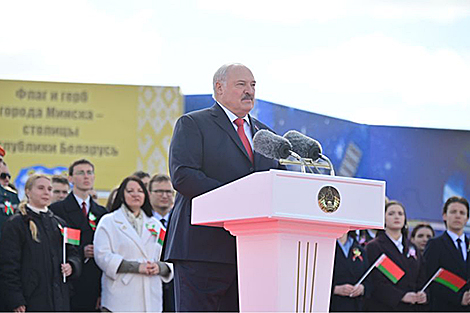
Speaking about the documents signed by the head of state, one should single out the decree, according to which a government commission has been set up in Belarus to oversee preparations for and all the stages of the actual admission campaign in 2024, including the centralized exam meant to evaluate aggregate academic achievements of secondary school graduates.
These and other details are covered by the latest episode of BelTA’s special project President’s Week.
MEMORY STRONGER THAN TIME. What errors of the year 1941 has Belarus taken into account?
The president took part in a solemn meeting on the occasion of Victory Day in the Palace of the Republic on 7 May. The head of state awarded the pennant “For valor and perseverance during the Great Patriotic War” to nine Belarusian settlements.
The head of state noted that there are many bright pages in the country’s history, of which Belarusians are justifiably proud. There are some that do not change due to the passage of time or due to circumstances. They are passed down through generations with mother's milk, protect the nation against mistakes and help build the future. “For Belarusians the Victory of the Soviet people in the Great Patriotic War was such an event,” the president stressed. “For us, Belarusians, the truth and the memory of the war are timeless and transcend borders.”
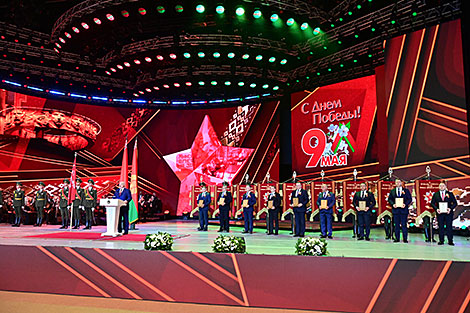
An incredibly high price was paid for peace and freedom. More than 300,000 of Belarus residents were driven to Germany as slaves. The notorious Trostenets camp alone took lives of more than 200,000 civilians. “No matter how much anyone in the ‘great democracies’ opposes or obstructs, no matter what they say, regardless of personalities and the statute of limitations we will identify and bring to justice all those involved in the atrocities committed by the Nazis. Even posthumously or in absentia,” the Belarusian leader stated.
In these conditions the truth about the crimes of fascism serves as a serious warning to humanity, and the preservation of historical memory acquires special significance.
“It is high time the nations of Europe understood that the Great Victory is our common legacy. Thanks to this victory and to the political, economic, and military might of the Soviet Union peace on the Eurasian continent was secured for many decades,” the head of state stressed.
The president also pointed out that the modern generation has a worthy example to follow – Great Patriotic War veterans. Unfortunately, not many of them are still alive today. In the first few years after the war they were weakened and had lived through many hardships, privations, and suffering, and yet they found the strength and courage to restore the country. They did everything and even more than that for the post-war generations. “We shouldn’t forget it. Once we do, this disaster will befall us,” the Belarusian leader urged.
In his speech Aleksandr Lukashenko traditionally made a few comments in response to the latest news. Western politicians should learn them by heart before planning any actions against Belarus. Let us remind you what the head of state warned about and what he called for.
Pushiness of “masters of the world” and response to the deteriorating situation
Aleksandr Lukashenko pointed out that politicians of some countries consider themselves masters of this world now. Blatant and unceremonious interference in affairs of sovereign states has become an ordinary routine for them. As a result, no state feels protected against external aggression now. The expansion of military blocs and unions to the detriment of security of other countries and the unprecedented buildup of NATO’s potential in the Eastern Europe region further inflate tensions.
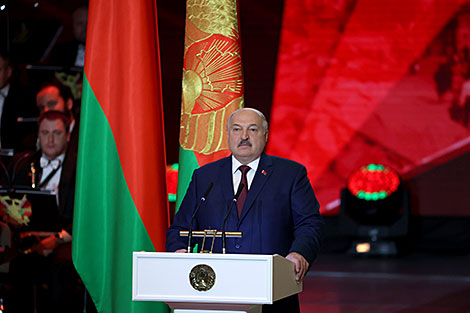
“All of it is already at the western and southern borders of Belarus,” the head of state stressed. “From individual figures we hear talk about wars and nuclear strikes.”
In these conditions Belarus takes a set of steps to adequately respond to the deteriorating situation. These efforts proceed according to plan and include several stages.
In response to the concentration of military units near Belarus’ northwestern borders the country held an exercise to practice the prevention of infiltration of sabotage and reconnaissance forces, illegal armed units into Belarus’ territory. A snap inspection involving mobilization and full combat readiness of mechanized and air defense brigades was completed against the same background. It was followed by a large-scale inspection of air defense forces.
These inspections demonstrated the effectiveness of the existing system of combat readiness and mobilization readiness, the ability of brigades to promptly switch to the highest combat readiness status and carry out their missions.
An exercise to practice the deployment of non-strategic nuclear weapons
During the solemn meeting Aleksandr Lukashenko mentioned an inspection of the Belarusian-Russian joint regional military force, including steps to practice the deployment of non-strategic nuclear weapons. In the course of the inspection special munitions were delivered to missile forces and Air Force units. The munitions were loaded into launch vehicles and attached to aircraft.
The matter was also discussed in Moscow with Vladimir Vladimirovich Putin the next day. The two leaders told reporters about it after a Victory Day parade in Red Square. Aleksandr Lukashenko said: “One can say we did the first stage separately. But yesterday we made the decision in favor of synchronization and of doing the second stage and the third one together.”
During the solemn assembly held in Minsk on 7 May in anticipation of Victory Day Aleksandr Lukashenko said: “I’d like to note that this inspection is purely defensive. It is designed to ensure the readiness of Belarusian army units to handle special munitions and to polish the mechanism of control over the troops and interaction of Union State command bodies.”
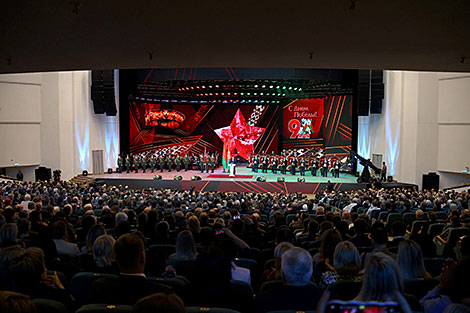
“Listen, these are weapons of deterrence, weapons of defense. Nobody will launch an offensive with these weapons,” the head of state assured.
An instant response to aggression
Aleksandr Lukashenko noted: “I am a peaceful man. I don’t want a war. I am a historian and know well that Belarus has never waged its own wars. Belarus has always been a theater of war.” It was the same in June 1941 when efforts were made to the last moment to assure everyone that the war would not happen.
The president pointed out that Belarus does not intend to succumb to any provocations and is not going to fight a war against anyone. “Throwing the country and millions of people into the furnace of war is not my job. Our job is to inflict unacceptable damage to the enemy if once again an enemy soldier steps on our soil like it happened in the past,” the Belarusian leader stated.
This is why, the president added, as the commander-in-chief he had decided to deploy military units on all the probable directions of attack. Units of the border service and the Internal Affairs Ministry are also employed in the defensive measures.
Aleksandr Lukashenko said: “If things are quiet, it is fine. Then things will be calm and quiet in our country, too. If someone uses weapons against us, we will respond. And instantly at that. We will not draw any lines. We don’t have thousands upon thousands of kilometers of territory Russia has. Russia can draw lines and wait for something. It is impossible to capture Russia right away. But the latest war demonstrated that Belarus can cease to exist within a month. It could be done even faster these days. This is why no lines. Absolutely none. Any aggression will be met with an instant response.”
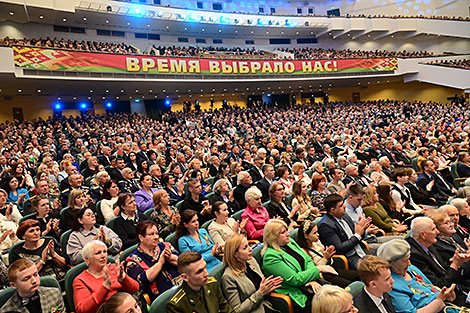
Aleksandr Lukashenko noted that Belarus responds to all attempts of intimidation with a consistent peacekeeping position and a policy of strategic deterrence. The country has taken into account the mistakes of the beginning of the Great Patriotic War. During the first session of the 7th Belarusian People’s Congress two fundamental documents were adopted: the National Security Concept and the Military Doctrine. They define specific strategic measures that will help ensure reliable protection of the constitutional order of Belarus, sovereignty and peaceful life of the nation.
Aleksandr Lukashenko does not believe that the well-off Western Europe is willing to go and fight in dirty, lousy trenches. “They are no longer accustomed to that. Our young people, you know, don't want that either. It is we, who were born then, not far from Great Victory, who understand what it cost our parents and grandfathers. But we have to be ready for anything,” the president said. “It is my fate and the fate of those, who stand with me, is to have to be able to respond to any threat.”
“I repeat once again: we are an absolutely peaceful country and do not consider any state as an enemy. But if necessary, the Belarusian people will rise up to defend their native land, using all possible forces and means,” the Belarusian leader added.
He also stressed importance of maintaining and reinforcing people’s unity in Belarus since not only military force is always important for protecting the country.
TEN YEARS LATER. What does Aleksandr Lukashenko think about EAEU accomplishments?
Aleksandr Lukashenko went to Moscow on 8 May for a two-day visit. In the evening the head of state took part in a jubilee summit of the Eurasian Economic Union – May marks exactly ten years since the Eurasian Economic Union Treaty was signed.
Despite the first jubilee date the agenda of the international forum was quite businesslike. The leaders of the countries also communicated a lot on the sidelines of the forum, during a joint tea party and an informal dinner. The number of participants was much larger than the number of Eurasian Economic Union member states. In addition to the leaders of Belarus, Russia, Kazakhstan, Armenia, and Kyrgyzstan the presidents of the observer states –Uzbekistan and Cuba – took part in the work of the summit. The leaders of Tajikistan and Turkmenistan, who arrived in Moscow on the eve of Victory Day, joined them for the informal supper.
There were a lot of reasons to offer congratulations to each other. Victory Day, the Eurasian Economic Union anniversary, and the inauguration of Vladimir Putin as the Russian president on 7 May after getting re-elected in March 2024. Reporters noted that Aleksandr Lukashenko had brought a large bouquet of red roses to the summit. “Coincidence? I think not,” a prominent Russian TV host repeated the already popular phrase.
Bilateral meetings of the leaders of the countries took place on the sidelines of the summit. As for the Belarus president, it was revealed the next day that he and Vladimir Putin had worked together till three in the morning. They discussed military affairs among other things.
Speaking at the Supreme Eurasian Economic Council session in Moscow on 8 May Aleksandr Lukashenko praised the union’s accomplishments but also drew attention to various matters the parties have yet to address: “Even according to the most rigorous requirements one can state with confidence that the first ten years have been quite successful. We have almost reached the final stage of realization of the Strategy 2025.”
In his words, the adopted measures have objectively contributed to the increase in mutual trade of the EAEU member states. In 2023 its growth rate amounted to almost 105%. In absolute figures it was about $90 billion. This figure was achieved despite the continuing complicated situation in the world markets.
“The main thing is that we have learned to hear each other better. Neither GDP growth nor an increase in real incomes of the population would have been possible if we had stayed apart from each other. Not every one of us would have been able to preserve its sovereignty. No doubt that a lot has been done,” Aleksandr Lukashenko said. “Our union is still relatively young, but a great deal of effort, energy and funds has already been invested in its development. It is our responsibility to make sure that it continues to develop for the benefit of our peoples and becomes a real pole of economic attraction in the modern world. I am absolutely convinced that we can do it.”
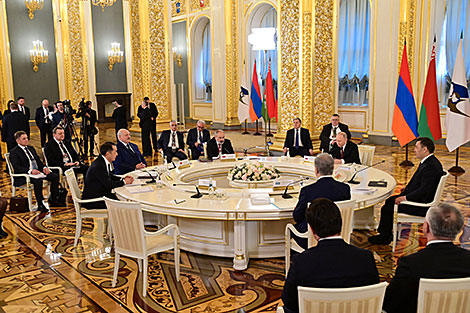
The head of state noted that active and persistent efforts of the Russian Federation to build up partnership within the framework of the Eurasian Economic Union have never been more important.
The president stated that the number of issues and challenges concerning the development of the union had not decreased and cited several vivid examples.
Manufacturing cooperation
The head of state recalled that fundamental decisions were made last year in order to financially support manufacturing cooperation. Despite this serious business activity has not yet gained traction. “I would like to note once again that work in conditions of the sanctions-fueled pressure requires making decisions without delay. Quick decisions. The leaders of the participating countries make such decisions promptly for the most part. However, the decisions are not always implemented quickly,” the Belarusian leader noted. “I would like to draw attention of all those present to the fact that such sluggishness really affects financial results of our enterprises and leads to tougher competition from third countries.”
Taking into account the introduction of a new mechanism of financial support for manufacturing cooperation, Aleksandr Lukashenko asked the Eurasian Economic Commission to join this work and organize interaction both in the context of industries and with the involvement of business associations and unions of the EAEU member states.
“Considerable funds have been allocated to subsidize projects and they need to be used purposefully and very efficiently. Our governments and the commission are responsible for it,” the head of state emphasized.
Unhindered access to public procurement
According to the president, the volume of public procurement in the EAEU countries is estimated at almost $200 billion. In fact, as buyers of goods, works and services the states fully control this market and determine the procurement policy and acquisition channels.
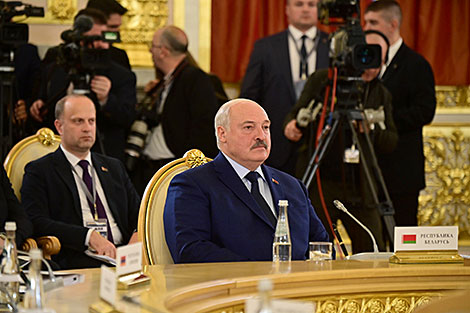
“If we really control it, then let’s ensure mutual access at least in the areas where the EAEU-made products can become an effective source for satisfying state needs,” Aleksandr Lukashenko said.
He stated that national protectionism still persists in this sector: in reality the market is protected not from imports from third countries, which account for almost two-thirds of the EAEU’s public procurement, but from goods and services produced in countries of the union. “In other words, every one of us protects their markets from their own partners,” the president noted.
“I am convinced that the issue of expanding mutual participation in public procurement requires an urgent solution. Because it is closely related to import substitution and technological sovereignty. By and large, this is our security and independence,” the head of state said.
Digitization
Aleksandr Lukashenko stressed the need to focus on the prompt recognition of digital signatures: “We have been talking about it for years. All essential agreements were reached long ago, but things are still were they started. After all this is not a political but technical issue. However, it often becomes an impassable barrier to the participation of Eurasian businesses in the economic processes of the EAEU member states.”
The president believes it is necessary to complete this work as soon as possible.
Technical regulation
The matter of technical regulation is closely related to the previous matter. “Work on a technical solution is in the final stage. The only thing we need to do is to digitize technical regulations,” Aleksandr Lukashenko said. “I am sure that no one in this hall needs to be convinced that the digitization of technical regulations will provide our manufacturing sector with additional opportunities for development. It will simplify the receipt of information and the processes of certification and standardization.”
Transport services
Aleksandr Lukashenko mentioned that work in this area is coordinated on the whole both at the national and supranational levels: “We have managed to find alternative routes to acquire goods, make arrangements (albeit temporary) on transshipment and reloading, and agree new terms for crossing borders.”
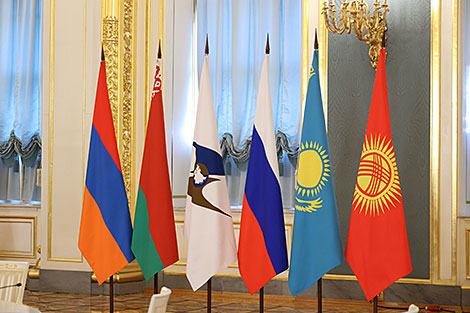
Nevertheless, Aleksandr Lukashenko pointed out the need for the Eurasian Economic Commission to establish a permanent channel for sharing information with Shanghai Cooperation Organization countries, primarily with China. This is necessary for more accurate management of cargo flows and the organization of efficient operation of border crossings.
Food security
The president believes it necessary to improve the work on unifying the requirements related to the circulation of agricultural products and to more actively introduce innovative approaches in the agribusiness complex.
“While doing it, it is extremely important for us to meet needs of our union for food of our own make. And we can do this. For this purpose our farmers need to have their own high-quality seed material among other things,” the Belarusian leader pointed out.
International positioning of the EAEU
“Our geopolitical opponents are trying to isolate us from advanced technologies and premium markets, to restrain our development. But despite this we are consistently moving forward,” the president said.
He recalled the signing of a full-fledged trade agreement with Iran. The EAEU has also been building up mutually beneficial cooperation with promising friendly countries: Indonesia, the UAE, and Mongolia.
“However, in our opinion, the work on establishing partnerships with third countries needs to be systematized. In the current geoeconomic realities it is necessary to clearly understand with what countries, in what sequence and in what timeframe we will form a free trade zone, and with which potential partners we will limit ourselves to interaction within the framework of memorandums,” the head of state said.
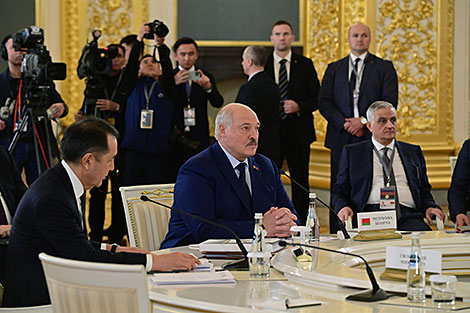
The president believes that so far the EAEU has paid insufficient attention to dialogue with the African continent. “Africa needs a wide range of our goods, works, services and technologies,” Aleksandr Lukashenko said. “Just like Latin America Africa has had enough of colonialism from the respective leading countries. This is the moment when we must come to Africa.”
Parallel participation of the EAEU countries and partners in the Commonwealth of Independent States in the SCO and BRICS also offers huge opportunities.
“But we should not forget about our closest neighbors, friends, and brothers. Interaction with the EAEU observer states and the CIS countries should be in the zone of constant and close attention,” the Belarusian leader added.
SHREWD, SMART, ON POINT. What does Aleksandr Lukashenko think about the Red Square parade?
Aleksandr Lukashenko celebrated Victory Day in Moscow first. He and other foreign leaders attended a military parade held in Red Square in honor of the 79th anniversary of the Victory in the Great Patriotic War of 1941-1945.
The leaders of Kazakhstan, Uzbekistan, Kyrgyzstan, Tajikistan, Turkmenistan, Cuba, Laos, and Guinea-Bissau also attended the parade. President of Russia Vladimir Putin made a speech. He underlined the importance of protecting historical truth and of preventing the revival of fascism, the stirring of interethnic and interreligious strife. A minute of silence was observed in memory of the war dead.
After the parade the leaders of countries went together to lay a wreath and flowers at the Tomb of the Unknown Soldier in Alexander Gardens outside Kremlin walls.
Impressions of the parade
The mechanized part of the parade was traditionally opened by a legendary Great Patriotic War battle tank T-34 under a combat banner of the 1st Guards Red Banner Tank Army. Specimens of special armored KamAZ trucks with 4x4 wheel arrangement and protected sanitary vehicles Linza were presented in Red Square for the first time. The latter are designed to provide all kinds of support services on a battlefield such as finding and evacuating personnel from a battlefield. The parade also featured high-precision missile systems Iskander-M and air defense missile systems S-400. A mechanized column of strategic missile forces featuring autonomous launch vehicles of the missile systems Yars rolled past the stands.
In Minsk reporters asked the head of state to share impressions of the Moscow parade. The head of state remarked that it was not the first time he had been asked a question about the parade in Red Square. His Russian counterpart Vladimir Putin was the first person to ask this question. Russian Defense Minister Sergei Shoigu asked the same question some time later.
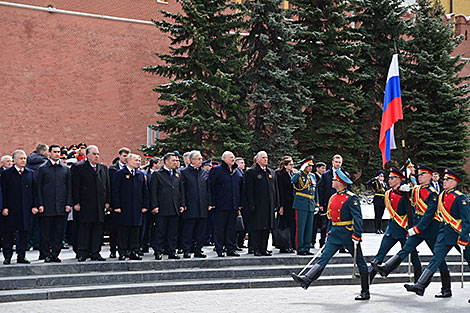
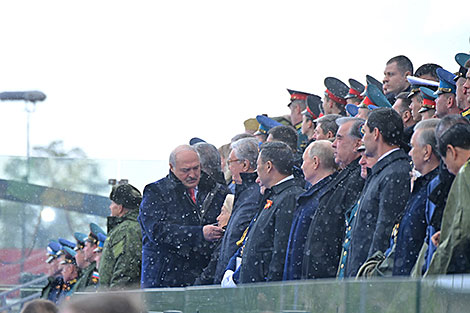
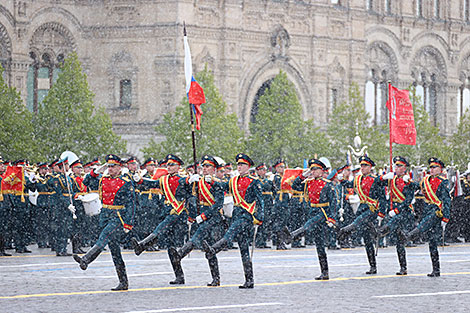
“I can tell you sincerely and absolutely honestly that as far as the spirit and the content are concerned, no one knows how to organize such events as well as they do. It was a parade that did not exactly resemble parades of the past. But times have totally changed. You may have noticed how shrewdly they reflect this moment and did what had to be done today,” Aleksandr Lukashenko said.
The president said he had been made familiar with some comments about the parade. Some criticize the fact that heavy hardware was not demonstrated during the parade. The head of state rejected such insinuations as out of context. “Were they supposed to remove battle tanks from the frontline and bring them to Red Square? And on top of that, did they have to redeploy them perhaps to Belarus for the sake of showing off? Nobody needs that. Tanks and soldiers have always marched from Red Square to the frontline since 1941,” Aleksandr Lukashenko remarked.
“This is why everything was shrewd, smart, thoughtful, and on point. Just the way it should be done today. They demonstrated their might. If someone knows how to think and read, you may have noticed that at the end they rolled out [strategic intercontinental ballistic missile systems] Yars. Those are strategic weapons. Those, who know how to think and read, realized: guys, let’s live in peace. And those, whose brains are befuddled, got a message: you’d better not tangle with us. Everything went like it should today,” the president concluded.
The story of a 101 woman veteran and the president’s care
The head of state watched the parade in Moscow next to the veteran Yekaterina Yevdokimova. Aleksandr Lukashenko was caught on camera while adjusting the collar of her jacket: it was snowing and windy in Moscow at that moment.
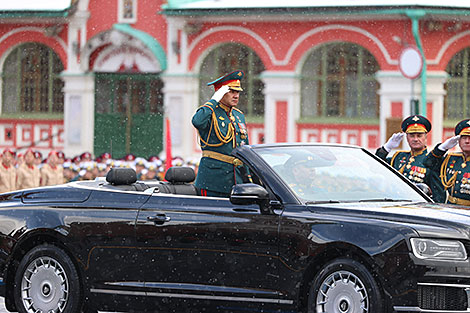
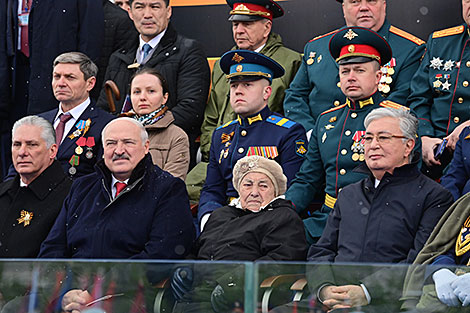
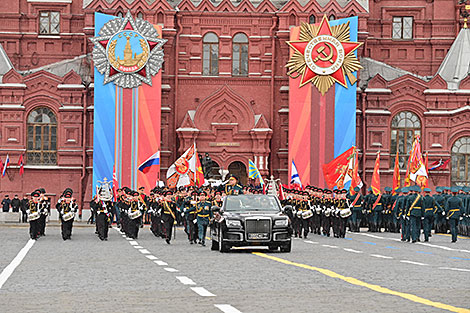
“She is a person, who fought here, outside Baranovichi. She wounded a German and took him prisoner. She brought him in and a lot of people, villages, and so on were saved,” Aleksandr Lukashenko said. “When I approached her, she recognized me and started talking fast in order to tell me things. I listened to her. She is 101 years old! I kept sitting there and envying her: she was still on her feet and spry.”
The president remarked that it was very cold in Moscow. The low air temperature, which is unusual in May by itself, was not the main problem. “Red Square is like a funnel with lots of wind. I was lucky that [Uzbekistan President Shavkat] Mirziyoyev had brought me a jacket. I could have died of cold without it. It was very cold. And I saw that this woman, a hero, a patriot, virtually our woman… Her jacket was lying nearby. I helped her put it on and buttoned it up. I tried to keep her warm,” the president said.
“101 years old… God bless everyone to live that long! And to have a working brain and stay on your feet,” Aleksandr Lukashenko added.
BELARUS NEEDS PEACE. Why did the Great Victory become the key moment in the revival of the Belarusian nation?
After returning from Moscow the head of state took part in Victory Day festivities in Minsk in the evening on 9 May. He laid a wreath at the Victory Monument in Pobedy Square. Personally taking part in the wreath-laying ceremony is a tradition the president observes every year.
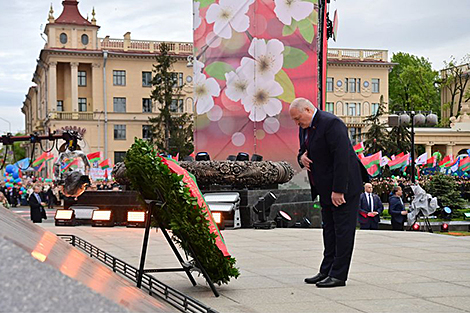
Aleksandr Lukashenko has congratulated fellow Belarusians on Victory Day. In his congratulatory message he stressed that the truth about the Great Victory protects Belarusian land from threats of the modern age. It protects the entire humanity from the revival of destructive ideas of Nazism.
The head of state extended greetings to a number of foreign leaders – partners in the Commonwealth of Independent States, the nations of Georgia, Moldova, and Ukraine, top government officials of the Russian Federation and the head of the Russian Orthodox Church as well as heads of international and regional organizations. Multiple congratulatory messages on the occasion of the Victory anniversary were also sent to Aleksandr Lukashenko and the Belarusian people.
During the ceremony held on 9 May to lay wreaths and flowers at the Victory Monument as part of the patriotic campaign “Belarus remembers!” Aleksandr Lukashenko stressed that the Great Victory is the central and key moment in the history of revival and establishment of the Belarusian nation: “Today its lessons allow taking a glimpse of the future if one remembers and knows the past. While the zest for life and the creative energy of the generation of victors, who restored the country from ruins, set an example of how we should live and work.”
“Belarus needs peace. Tomorrow. In a year. Always. It is important for us to endure and stay out of conflicts. Time has chosen us. We have been chosen to preserve the independence of our land and everything created by many generations before us. Everything we jointly take pride in and admire. With this in mind we develop the economy, reinforce defense, and raise young citizens as patriots. We keep peace and wellbeing in the native land as the ancestors willed it. The Great Victory they secured inspires us with the belief that Belarusians are capable of overcoming everything and persevering,” the head of state said.
Once again the president drew attention to today’s reality by noting that the West is ready to strike a deal with any evil in order to preserve supremacy. “Today’s Nazis no longer wear boots and black shirts. They act more subtly and cunningly. Without feeling any shame Europe glorifies and welcomes SS troopers and nationalists of all kinds. Heads of state give them a standing ovation having forgotten the outcome of the Nuremberg Trials. Without heeding history, morals, and laws they have once again started pitting countries and nations against each other,” Aleksandr Lukashenko said.
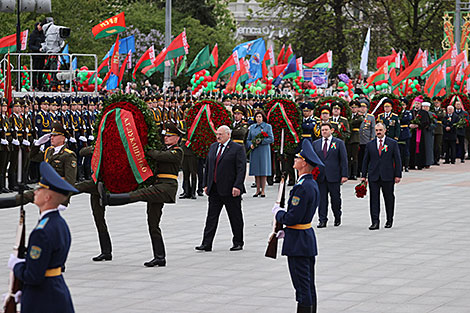
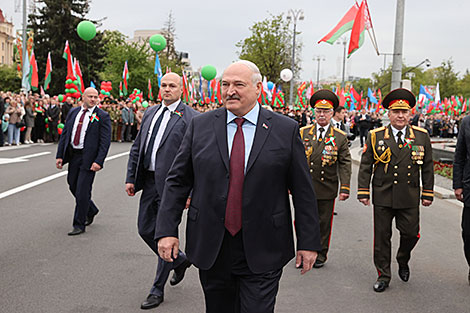
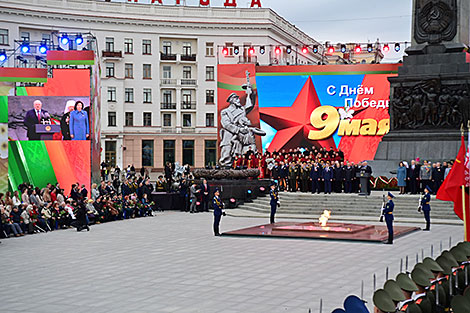

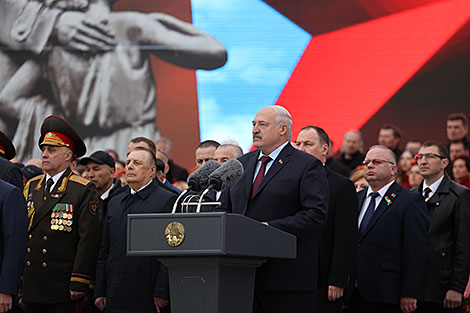
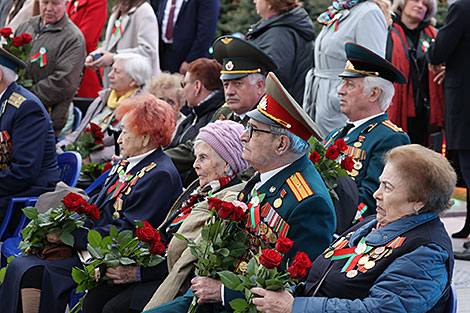
He stressed that today the voice of everyone, who speaks up to defend peace, who desires cooperation, and shares ideals of justice and global equality, has never been more important. “We should do everything to prevent World War Three. Otherwise, a nuclear apocalypse will be unavoidable. All of us have to unite for this purpose,” the president stated.
Meanwhile, Belarus is ready to defend itself and prevent the repetition of the tragedy of the past war. “External challenges and attempts to put pressure on our country have resulted in stronger Belarus. We will do everything to discourage even thinking about testing it in practice,” Aleksandr Lukashenko stressed.
After taking part in Victory Day festivities the president talked to reporters. He shared his impressions of the military parade in Moscow and the story of the woman veteran he had watched the parade together with. He commented on the escape of a Polish judge to Belarus and promised to look into his application for political asylum.
Upon the request of reporters the president once again commented in detail on the exercise designed to practice the use of non-strategic nuclear weapons. Aleksandr Lukashenko assured that Belarus and Russia see nuclear arms only as deterrence weapons. However, tensions in the world are on the rise. The escalation primarily originates from Ukraine. But things are hot in various parts of the planet. “We have never been closer to a nuclear catastrophe. What are we to do in this situation? We have to learn how to shoot an assault rifle and keep our powder dry, including these deadly weapons,” the head of state said.
The president pointed out that the United States of America is also practicing the use of nuclear weapons in Europe. However, it is not done publicly. “What should we do in this situation? We have made a public statement about it. We have aircraft for carrying nuclear munitions in the form of bombs. We have well-trained guys. As for Iskander missiles, which are impossible to intercept, they are totally invulnerable. This is why we tell them: guys, calm down, we have everything,” the Belarusian leader said.
The inspection of the platforms of the non-strategic nuclear weapons includes three stages. Military personnel practiced preparing the warheads first. Now the general staffs are synchronizing their interaction. Results of the inspection will be summed up during the third stage.
“We are not going to attack anyone. But everyone needs to understand that we will retaliate. And all those talks that he draws no lines are absolutely correct. I am not a fool but I draw no lines,” the Belarusian leader stated.
NATIONWIDE TRADITION. What special symbolism does Day of the State Flag, the Emblem, and the Anthem possess?
On Sunday the country celebrated Day of the State Flag, the State Emblem and the National Anthem. Speaking at the solemn meeting, Aleksandr Lukashenko remarked that the tradition of honoring the most important symbols of sovereign Belarus has become part and parcel of the nation’s life.
“On the fertile ground of love for the Motherland, this tradition has grown into our hearts, becoming truly nationwide,” the Belarusian leader stressed.
On this day thousands of young men and women throughout the country take an oath of allegiance to the state symbols. “This is a sign of deep respect for the past - the spiritual and moral values bequeathed to us by our ancestors. This is sincere gratitude for the peaceful and happy present, which has been ensured by the older generation of contemporaries,” Aleksandr Lukashenko said. “But most importantly this is a demonstration of readiness to take responsibility for the future of their country.”
This day is full of special symbolism for the president. The first referendum in the history of sovereign Belarus took place nearly 30 years ago, on 14 May 1995. Back then the nation determined its own way of development and laid the foundations of the policy of the Belarusian state. Those are strong presidential power, a strategic union with Russia, and equal state status for the Belarusian language and the Russian one.
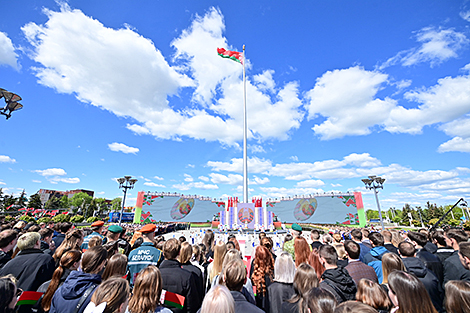
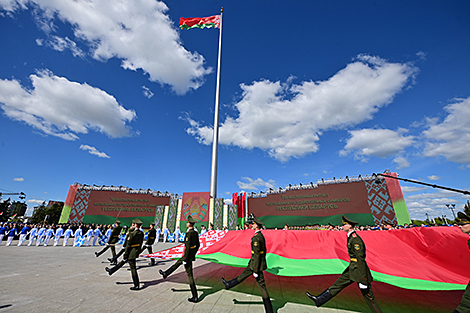
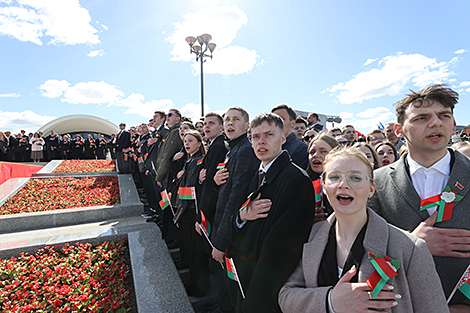
“Not succumbing to threats of modern collaborators, or rather, political traitors, staying true to ourselves, our principles and ideals, and our history, we defended our true state symbols together. Together we said ‘no’ to the symbols that have become a real sign of disaster for us,” Aleksandr Lukashenko stressed.
“Today these symbols not only unite but also represent a source of confidence and inner strength. Our emblem, flag and anthem as well as the entire policy are inspired by ideas of national dignity and genuine democracy,” Aleksandr Lukashenko stressed. “We carefully preserve the connection between generations, continue traditions of our ancestors, and are proud of our history. It has many heroic pages. We have never flinched. We have never changed the policy that we pursue today.”
In his words, modern state symbols not only embody the unparalleled strength of spirit and contribution of the Belarusian nation to the Great Victory over the Nazism, a labor feat of the fathers and grandfathers. A lot of sport victories, art victories, and labor victories have been achieved under these symbols in the history of sovereign Belarus.
The flag of Belarus was raised by polar scientists in Antarctica, by paratroopers at the North Pole, and by climbers on Mount Everest.
“This flag has been flown to outer space three times. First with Oleg Novitsky, a native of Belarus. And most recently with the first Belarusian cosmonaut, Hero of Belarus Marina Vasilevskaya,” the president said.
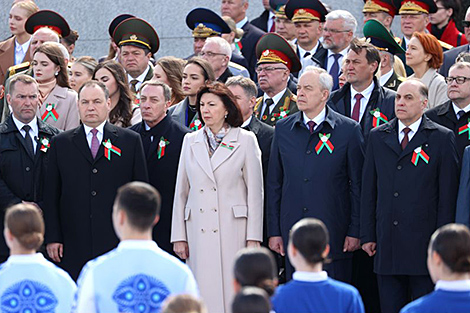
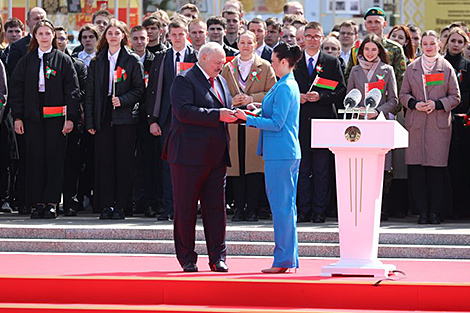
During the solemn ceremony Marina Vasilevskaya handed over a state flag that had been to the International Space Station to Aleksandr Lukashenko. This state symbol will occupy a place of honor in the Palace of Independence.
And on the whole, the state symbols have become part of life and achievements of the Belarusian people in various spheres. “People are proud to be genuine Belarusians. This is what the national unity stands for. The unity, which is sealed by the strong memory of the heroic feat of our grandfathers and great-grandfathers in the Great Patriotic War, by patriotism, creative work and the desire for peace. The unity, which is symbolized by the State Flag, the State Emblem and the National Anthem of the Republic of Belarus. The unity that we must keep in order to preserve our country. Because time has chosen us!” Aleksandr Lukashenko stressed.







 print version
print version make home page
make home page add to bookmarks
add to bookmarks

